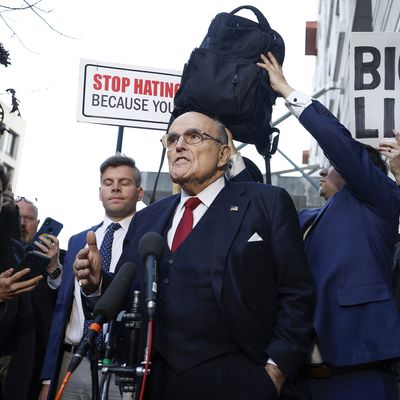
In 2021, federal agents raided Rudy Giuliani’s home and office and seized his electronic devices as part of an inquiry into his dealings with Ukraine. Though the former New York City mayor was never officially charged in the matter, newly unsealed documents revealed that Giuliani’s troubled finances were a major factor.
Search warrant materials, made public following a request to the judge from the New York Times, reveal that prosecutors thought Giuliani’s foreign lobbying could be an attempt to supplement his income. Per the Times, Giuliani had around $1.2 million in cash and about $40,000 in credit-card debt when he left his legal firm to become Donald Trump’s personal lawyer in May 2018. By early 2019, that debt had ballooned to $110,000, leaving the former mayor with only $400,000. A divorce settlement with his third wife, Judith Nathan, reportedly further depleted Giuliani’s accounts to less than $300,000.
Around that time, Giuliani began his overtures to Ukrainian officials, urging them to investigate then–presidential candidate Joe Biden and his son Hunter Biden’s ties to the company Burisma. Prosecutors also examined Giuliani’s attempt to work out a $200,000 deal with Yuriy Lutsenko, a Ukrainian prosecutor, for Lutsenko to retain Giuliani’s legal services to help locate misappropriated Ukrainian assets. The deal ultimately didn’t go through. The Associated Press reports that investigators were also looking into whether the former mayor received anything in exchange for pushing the Trump administration to force out Marie Yovanovitch, the U.S. ambassador to Ukraine.
Giuliani’s financial woes have only deepened in recent months. Last week, a Washington, D.C., jury ruled that he must pay $148 million in damages to Ruby Freeman and Shaye Moss, two former Fulton County election workers whose lives were upended after Giuliani promoted and pushed lies about them following the 2020 election. Before the decision, Giuliani’s lawyer Joseph Sibley called the amount of money being sought in the defamation case the “civil equivalent of the death penalty.” On Wednesday, a federal judge ordered that Giuliani must pay the $148 million penalty to Moss and Freeman as quickly as possible out of concern that he might attempt to hide his assets, per the Washington Post.
It’s unlikely that Giuliani will be able to pay anywhere close to what he owes. In addition to the defamation sum, Giuliani is also on the hook for several additional outstanding debts. He is currently being sued by one of his former lawyers, Robert Costello, for lack of payment. In October, it was reported that the IRS had placed a lien on his Palm Beach condo. And the problems don’t stop there: Giuliani is still a co-defendant in Georgia’s election-interference case, a matter that will require him to retain a lawyer for months at least through 2024.
On Thursday, there was an even stronger sign of Giuliani’s ongoing financial strife. The former mayor has reportedly filed for Chapter 11 bankruptcy just days after defamation ruling, his court filing listing about $153 million in debts.
“Chapter 11 will afford Mayor Giuliani the opportunity and time to pursue an appeal, while providing transparency for his finances under the supervision of the bankruptcy court, to ensure all creditors are treated equally and fairly throughout the process,” said Ted Goodman, Giuliani’s political adviser, in a statement.






























